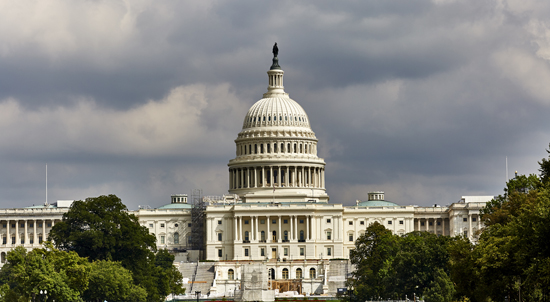Overview
Sponsors
Led by Senate Banking Chairman Mike Crapo (R-ID) and Ranking Member Sherrod Brown (D-OH), with the support of 5 Republicans and 4 Democrats.
Status
The House passed its version of this reform — the Corporate Transparency Act (CTA) — late last year in a vote of 249 to 173. The Trump Administration sent a notice of support the same day as the vote.
Building on the work of their colleagues — a bill initially led by Senators Mark Warner (D-VA) and Tom Cotton (R-AR) — Banking Chairman Crapo (R-ID) and Ranking Member Brown (D-OH) negotiated for several months, made additional changes and business-friendly changes, and filed the AML Act as an amendment to the FY21 National Defense Authorization Act (NDAA). The Senate bill also has Administration support.
Due to procedural issues, the AML Act was not ultimately included in the Senate Defense bill, but the CTA was included in the House defense bill. The final text of the provision is now being negotiated between the House and Senate as a part of the NDAA conference committee. The NDAA is expected to be finalized in November 2020.
Background
Anonymous companies are the vehicle of choice for the criminal and the corrupt to launder illicit funds with impunity. Drug cartels, human trafficking rings, purveyors of counterfeit and pirated goods, rogue nations evading sanctions, corrupt officials concealing bribes and stealing from state coffers, and others use anonymous corporate structures to move and hide illicit wealth.
What Does It Do?
The Anti-Money Laundering Act makes a number of straightforward updates to our anti-money laundering rules. The most significant piece of the legislation takes the simple, yet effective step to require corporations and limited liability companies (LLCs) to disclose to law enforcement and others with legally mandated anti-money laundering responsibilities (e.g. financial institutions) information on who is the real, natural person (a.k.a. beneficial owner) who owns and controls an entity at the point of formation and update such information upon any change.
Who Supports It?
The U.S. Chamber of Commerce, national security experts, police, sheriffs, local prosecutors, state Attorneys General, federal prosecutors, human rights advocates, anti-human trafficking groups, faith-based networks, international development NGOs, several CEOs and businesses, banks, credit unions, real estate professionals, insurance companies, over 125 non-governmental organizations, and scholars at both conservative and liberal think tanks, among others.[1]
The Details
What Information Is Required?
Just four pieces of readily available information — a name, address, date of birth, and driver’s license or other identification number. No financial information or details about business purpose or operation is required.
Where Is the Information Stored, and Who Has Access to It?
Information would be reported to the U.S. Treasury’s Financial Crimes Enforcement Network (FinCEN). FinCEN is our nation’s financial intelligence unit with the responsibility of housing and reviewing data to protect our financial system from abuse by terrorist networks and other criminals who seek access to our markets and our economy.
Law enforcement agencies at the state and federal level would have access to the information for use in authorized investigations as would financial institutions (with customer consent) that have legally mandated anti-money laundering (a.k.a. ‘know your customer’) obligations.
What About Reporting Changes in Ownership?
The AML Act requires updated reporting if and only when there is a change in ownership.
Are All Companies Required to File?
There are exemptions for certain entities that file redundant reports with other agencies (e.g. publicly traded firms file relevant information with the SEC), or that are lower risk (e.g. larger private companies with real operations in the U.S.).
What Are the Penalties for Violating the Law?
There are civil and criminal penalties, including fines of up to $10,000 and up to three years in prison for knowing and willful violations. Negligence (e.g. honest paperwork violations) is not punishable under the bill.
Is It Workable?
Yes. The U.S. Department of Defense and the Department of the Treasury both have programs in which they are collecting beneficial ownership information for certain higher risk real estate transactions without incident.
The U.K. has a beneficial ownership directory. Analysis has shown that compliance has cost businesses an average of just £2 (~$2.50) a year.[2] Another study found that the average number of owners per business in the U.K. is 1.13.[3] Per the U.S. Small Business Administration, approximately 78 percent of all businesses in the U.S. are non-employer firms, meaning there is only one person in the enterprise. This suggests that the U.S. experience would track that of the U.K.
Will It Make a Difference?
The early evidence, where transparency is in place, suggests it will have a significant impact.
- An early analysis of FinCEN’s efforts to collect ownership information in certain real estate transactions found that, “…about 30 percent of reported transactions involve a beneficial owner or purchaser representative that was also the subject of a previous suspicious activity report.”[4]
- A NY Federal Reserve study of FinCEN’s program found, “After anonymity is no longer freely available to domestic and foreign investors, all-cash purchases by corporations fall by approximately 70 percent, indicating the share of anonymity-seeking investors using LLCs as ‘shell corporations.’”[5]
- An analysis of the U.K. directory found robust law enforcement use of the information.[6]
For additional information, contact Erica Hanichak at ehanichak@thefactcoalition.org.
[1] See: http://bit.ly/2MKKedo.
[2] U.K. Department for Business, Energy & Industrial Strategy, “Review of the implementation of the PSC Register” (August 2, 2019). BEIS Research Paper Number 2019/005, http://bit.ly/2UfCxwo. p. 28.
[3] See https://bit.ly/306mN35.
[4] Steve Hudak, “FinCEN Targets Shell Companies Purchasing Luxury Properties in Seven Major Metropolitan Areas,” FinCEN, August 22, 2017; http://bit.ly/2Q3yDVs.
[5] Hundtofte, C. Sean and Rantala, Ville, “Anonymous Capital Flows and U.S. Housing Markets” (May 28, 2018). University of Miami Business School, Research Paper No. 18-3. Available at SSRN: https://ssrn.com/abstract=3186634.
[6] U.K. Department for Business, Energy & Industrial Strategy, “Review of the implementation of the PSC Register” (August 2, 2019). BEIS Research Paper Number 2019/005, http://bit.ly/2UfCxwo. p. 28.

